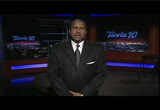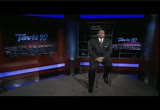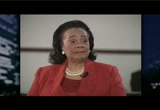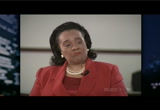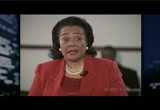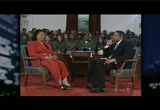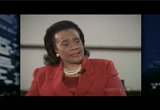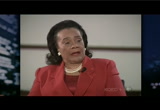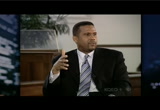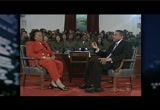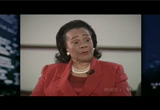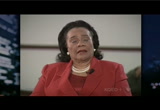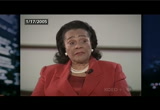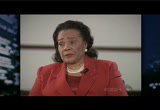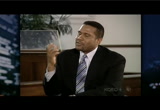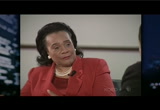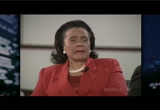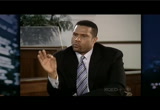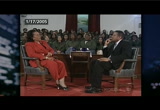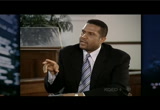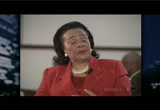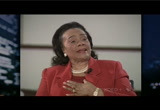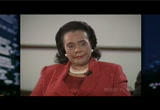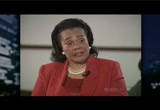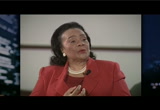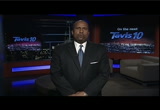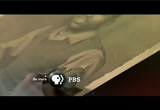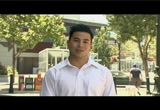tv Tavis Smiley PBS January 19, 2013 12:00am-12:30am PST
12:00 am
tavis: good evening. from los angeles, i am tavis smiley. tonight, as we get set to honor the memory of dr. martin luther king jr. this weekend, we cap off the 10th anniversary week by revisiting our conversation with a civil rights icon in her own right, coretta scott king. back in 2005, we traveled to atlanta for a very special program with miss king at the famed ebenezer baptist church, the church that was home base for dr. king during much of the civil rights movement. a conversation which would turn out to be one of her last on national television. we're glad you could join us to wrap up this 10th anniversary week with a conversation with coretta scott king, coming up right now. >> there is a saying that dr. king had that said there is
12:01 am
always the right time to do the right thing. i just try to live my life every day by doing the right thing. we know that we are only halfway to completely eliminate hunger, and we have a lot of work to do. walmart committed $2 billion to fighting hunger in the u.s. as we work together, we can stamp hunger out. >> and by contributions to your pbs station from viewers like you. thank you. tavis: as we kick off our second season in 2005, we could think of no better way to celebrate than by paying a visit to
12:02 am
coretta scott king at atlanta's iconic ebenezer baptist church. we traveled to atlanta for a special program with mrs. king, taped in front of a packed audience and broadcast on the king holiday that year. what we did not know or could not know was that this unforgettable conversation would be one of her last. it is nice that you on the program. thanks for sitting and talking with us. >> thank you for coming. tavis: i am glad to be here. i do not know how we can start our conversation with our recognizing where we sit, in this historic place. i was saying to this audience before you walk in that i got a chance to get to know you, honored to call myself a friend of yours. as many times of we get -- as we have talked over the years, we have never had a chance to talk in this place. talk about what it means for you when you walk into ebenezer.
12:03 am
>> certainly, i have many, many memories of being in this sanctuary, from being in the acquirer to listening to martin preach eloquent sermons. many of those sermons that people know about were preached from this very spot here. major instinct, in which he talked about how he wanted to be remembered, kncked midnight, three dimensions of a complete life, and many others. all the people who visited this church and spoke here, but the wonderful membership who gave us so much love and support, because there was always something happening in our lives that we needed to have support for. tavis: everybody talks about king-ian nonviolence.
12:04 am
i wonder whether or not you think, in the world we live today, whether or not his philosophy would work today the way that it worked during the time. >> absolutely. it will work today, 2000 years from now, 5000. absolutely. [applause] i think if people really read martin luther king jr., then they would begin to understand what he really represented. the philosophy that he developed was greatly influenced by gandhi and jesus christ. first of all, he said he got his inspiration and motivation from jesus and his techniques from gandhi. yes, nonviolence is a method that transforms, first of all,
12:05 am
the individual, once you understand it and embrace it. it begins with you. you think about transforming individuals so that they love unconditionally. tavis: a lot of folks say that dr. king never heard of osama bin laden and that a nonviolent philosophy in a world where we have people who are bent on doing the kinds of things that al qaeda is purported to have done, that that philosophy just would not fit. >> if martin's philosophy had been embraced and lived out in iraq and other places, we would not have bin laden. [applause] tavis: it is easy to say that after the fact, but much more difficult to institute that kind of love on the front side.
12:06 am
>> well, it is never easy because the process of nonviolence is one that takes time. those of us who have suffered, been persecuted over the years, would like to see things change overnight. more news to say, "i would like for it to come in the morning the bank the fact is that there is a process that you have to follow. the fact is that if you can imagine and visualize a situation where young children learn this philosophy at an early age and they go through school -- my vision for the king center was to start with preschool kids, and we did, teaching them at that level, the philosophy of nonviolence at that level. take them through elementary
12:07 am
school, develop curriculum for elementary, secondary, and high school. and then college. we have a program for college students. once they get to that stage and they have careers of their own, they are different kind of people because they have a different value system. we talk about freedom, love, justice. these are things we have to practice and see an example. thank god we have the example of dr. martin luther king jr. people need role models. they need to see examples of people in people's lives. that is why it is so important not only to commemorate his life, but the study and try to live by the principles of that life. [applause] tavis: let me shift gears here. i am fascinated by the life of
12:08 am
dr. king. i am also fascinated by the life of one of coretta scott king. i do not want you to shift to much in that seat, but i want to talk about you. they say that behind every great man, there is a great woman. if my granddad says, behind every good man, there is a good woman reminding you that you did not have nothing. [laughter] here is what i do know -- without coretta scott king, there would not have been a martin luther king jr. in the way we know him. our reminder -- i am reminded about the story of bill and hillary clinton when they returned to little rock, ark. the president had a favorite mustang he'd like to drive and the secret service would not let him drive it. he went back to little rock and
12:09 am
secret service follow them. they pulled into a gas station to get some gas and there was an old guys who had gone to high school with bill and hillary. there he was pumping gas and bill says, "look what would have happened if you married him." hillary said, "if i would have married him, he would have been the president." [laughter] [applause] i raise that, and that calls for some and modesty on your part, but i raise that because i know that you were there for dr. king in a way that we will never know or appreciate. i talked to a lot of dr. king's lieutenants and they will tell you that because he was human and not divine, although we think he was divine, he was just a man. an extraordinary man, but a man. he would get depressed and disappointed about all kinds of
12:10 am
things related to the movement. tell me what you would say to him, what your conversations were like in those moments. i assume he would come and talk to you. tell me about those moments when we did not see him giving a great speech in his pulpit. >> yes, there were many times when my husband felt depressed and was disappointed that the way in which people behaved, even responded to him, especially in the early days. i always tried to think of positive things to say to him, things that would be uplifting and things that i thought were true. because i think i knew him better than anyone else. to say that, i think i did
12:11 am
because i spend more time in -- with him in his adult years than anybody else. even his parents. martin wanted to be right. first of all, he committed himself to be a servant of god and the humankind. he was totally committed. when you have someone who is totally committed to serving god, following his conscience, what he felt was the right thing for him to do, when he was accused of something that he was not guilty of, it bothered him because he tried so hard to be right. i think that those were the times when i would see him get depressed. let me give an example of
12:12 am
something that was a very real. when we left montgomery, we were being investigated for our taxes and they had accused him of falsifying his taxes. of course, martin was very careful about making sure that he doubted all the is and cross all the t's. he said, they're not going to find anything. they decided, the date we moved to atlanta, the law enforcement people here arrested him. i could not understand why they arrested him when he got back to atlanta. that was his home. that is what it was. they had accused him of perjury, a very serious crime. when he realized that this was what had happened -- it had to
12:13 am
happen, he had to pay something like $1,500. not a lot of money -- in that day, it was a pretty good sum of money. he said, i do not have time to get lawyers and go to court, so i will pay this even though i do not owe it. they said that by paying it, that was an admission of guilt. he got very depressed, extremely depressed. he said, "i will spend the rest of my life trying to prove that i did not steal the money." i said, "you know you did not steal it. you just have to go on. people will eventually no." -- eventually know the bank -- know." the undersecretary of the united
12:14 am
nations said to him, "martin, if the state it -- if the state of alabama is against yours, who do you think they will believe?" tavis: i want to be respectful, but i want to find a way to ask this question. any number of comedians -- we have all seen any number of comedians step to the stage and make the joke about how they cannot understand how coretta scott king would not get remarried after martin king. how do you follow up martin luther king jr.? who are you going to get with? what do you do after dr. king? on a serious note, i wonder why or whether or not it was a conscious decision for you cannot remarry after all these years?
12:15 am
>> let me just say, why are you not married? [laughter] [applause] tavis: that is a good question. she is good. >> and you don't have the answer. tavis: i thought we were friends. >> let me just say that what people would not realize, i married martin luther king jr., who learned to love -- it was not love at first sight. because he was such an extraordinary human being and
12:16 am
our values were so similar and our outlooks were so much alike, we made a good couple. we were compatible. a very compatible. as i got to know him, i had more and more respect for him. when we decided to get married, it was like marrying the man that i loved. as we were thrust into the forefront of the cause, it was my cause, too, from the very beginning, because i had been an activist in college and involved in the peace movement and the human rights struggle back then. and so i married not only the man i love, but i married the cause as well. i could not have continued at -- after he was no longer here if i
12:17 am
had not had that kind of commitment. i always knew that i was called to do something. i did not know what. i finally rationalized that when i met martin. it took a lot of praying to discover this. this was probably what god had called me to do, to marry him. we did not know what was going to happen. when the movement began to unfold, it was very clear to me, a moment of truth when i realized that that is why we came to montgomery and that is what my whole life had led to. the path that i had followed from alabama, high school to college, to the new england conservatory in boston, where i met martin -- tavis: you never felt like you were putting your own life -- if you felt like that was your work, you never felt like you're putting your life on hold. >> never.
12:18 am
when the house was bombed in montgomery, there was a caller who said that they were going to kill martin. when the bomb hit, i thought, this is not about martin. i was in the house with the baby, yolanda, my oldest child. i had to do some serious soul- searching at that moment because i realized that i, too, could be killed. it is not easy. i came to that conclusion that if i had to give my life for the cause, i would be willing to do it as well. when martin was no longer here, i will do whatever i can to continue in my own way. i do not have martin luther king jr.'s ability and skills, but i
12:19 am
do have skills that you have given me. i will use those to the best of my ability. i just need to know the direction. it took a while for me to get the direction. i really felt that it came through the king center, to take not only -- helping, but i had to get in there and lead it myself. it was my vision. whenever it took. children -- my children were my first priority. one of them is here today, elder bernice king. [applause] >> -- tavis: i want ask you about how you balance being a parent, being a mother, and being there for martin at the same time. i want ask you a question about
12:20 am
why i am not married. there is a very simple answer. i am looking for a coretta scott king. when i find one, i will get married. [laughter] now that that is cleared up, my mama is watching one -- my mama is watching. >> let us all pray that he finds what he wants. tavis: my mama is doing that every day. tell me how you balance being a mother and all the fear and trepidation that came with being in harm's way because you were married to this man. how did you balance being there for him and, at the same time, being a mother? >> it was tough, i have to admit. when you make that commitment and you know what is most important -- the movement had an urgency about it.
12:21 am
sometimes maybe i had to deal with the urgency. kids have urgency's -- urgencies, too. i tried to do as much as i could as a mother, individually, but i had to travel, the away from the kids. i left them with my parents, a babysitter, or his parents. the best possible people i could find. people think i'm crazy running around the country behind this man. they do not understand, they do not know what i think and what it really is like. i do not know how much longer -- this was 1965. i do not want to have to deal with my fat -- with myself on the fact that he asked me to do something and i did not do it. and so i was there. almost impossible things. i just had to work them out. he never understood what
12:22 am
happened, how i got there. tavis: he just knew you got there. >> he just knew i got there. tavis: i could go on and on. let me pose this question. i know that you do not do politics. i will not ask you a political question, but i wonder what you think, given the world we live in today, all of the political, social, economic chaos that we see around us, what do you think dr. king could most inject in the public debate that is missing right now? what would he inject in this debate that would make us feel hopeful and better about the future that we're not hearing currently? >> let me just say that martin luther king jr. was called to do what he did. he was a moral voice, a moral force in our society. that is probably what is missing most.
12:23 am
there are no principles of stature that have the moral authority to speak and people listen. they did not always listened to him, but we know that, after the fact, america had listened and they understood. so many people said he was wrong when he came out against the vietnam war. all of the leadership, including black and white, turned against him. one year after he spoke, the whole nation reversed itself on the politics of vietnam. i am not saying that he is a saint or anything like that, but the reality is god used as an instrument to bring about all these phenomenal changes in 13 years and four months, all the changes that took place in our society and around the world. even the democracy that changed south africa was impacted by
12:24 am
this philosophy. nelson mandela sat in a south african prison for 27 years. he was non-violent. he negotiated his way out of jail. his unarmed suffering, 27 years in a south african prison, is ultimately what brought about the freedom of south africa. that is nonviolence. we do not have the moral authority. i know that it just does not happen. people have to allow themselves to be used by god. martin committed himself totally to god's will and purpose. god is always waiting for someone who is willing to do that. tavis: try as i did to get her to open up about her own life, it is hard to fathom the burden that coretta scott king carried
12:25 am
every day of her life following the tragedy in 1968. what an honor and truly unforgettable moment for everyone on this program to spend time with mrs. king in the church that served as the beating heart beat of the civil rights movement. on monday night, we will celebrate the 2013 king holiday. i will be joined by the man handpicked by mrs. king to publish the papers of her late husband, clayborne carson. until then, good night from los angeles. thanks for watching. as always, keep the faith. >> for more information on today's show, visit tavis smiley at pbs.org. hi, i'm tavis smiley. join me next time for a conversation with -- on king -- on king day 2013 by the man hand-picked by coretta scott king, clayborne carson.
12:26 am
>> there is a saying that dr. king had that said there is always the right time to do the right thing. i just try to live my life every day by doing the right thing. we know that we are only halfway to completely eliminate hunger, and we have a lot of work to do. walmart committed $2 billion to fighting hunger in the u.s. as we work together, we can stamp hunger out. >> and by contributions to your pbs station from viewers like you. thank you. >> be more. pbs. pbs.
137 Views
Uploaded by TV Archive on

 Live Music Archive
Live Music Archive Librivox Free Audio
Librivox Free Audio Metropolitan Museum
Metropolitan Museum Cleveland Museum of Art
Cleveland Museum of Art Internet Arcade
Internet Arcade Console Living Room
Console Living Room Books to Borrow
Books to Borrow Open Library
Open Library TV News
TV News Understanding 9/11
Understanding 9/11
